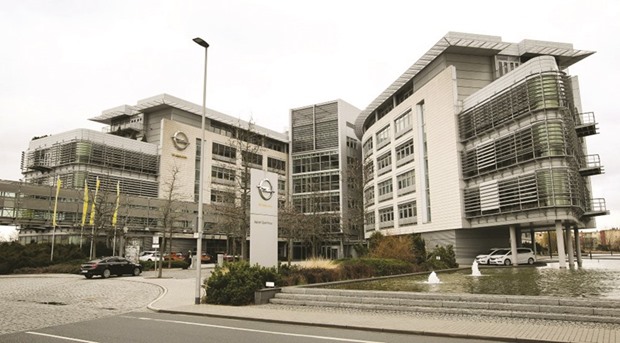PSA Group is betting that size is the answer in Europe’s saturated car market as it buys General Motors Co’s ailing regional division despite years of losses.
The maker of Peugeot and Citroen cars will pay €1.8bn ($1.9bn) for GM’s Opel unit and its UK sister brand Vauxhall, as the French manufacturer bolsters its defences in a peaking market that’s being transformed by technology, new competitors and Brexit. GM, which is taking a charge of between $4bn and $4.5bn, will retain a toehold in the area by continuing to sell Chevrolets in small volumes.
“It gives us the opportunity to become a real European champion,” PSA chief executive officer Carlos Tavares said yesterday after announcing the deal, which reinstates the French company as the region’s second-biggest auto manufacturer. “Our plan is to build a common future for Opel and Vauxhall and fix the existing issues.”
Picking up GM’s 1.2mn annual deliveries allows PSA to solidify a turnaround following its 2014 bailout, by spreading the costs for developing new vehicles across a larger network while achieving the savings necessary to compete amid Europe’s high wages and wafer-thin profit margins. Gaining scale is vital for mass carmakers as they try to stay ahead of self-driving and electric-car innovations and compete with new entrants including Uber Technologies.
GM, which has owned Opel for almost 90 years, is cutting ties after the division missed a target to break even in 2016, contributing to losses that have totalled about $9bn since 2009. In addition to the charge, GM is on the hook for much of Opel’s pension obligations and will pay PSA €3bn to settle some retirement plans. Still, the deal will free up about $2bn in cash, which GM plans to use for share buybacks.
While job and production cuts are likely as the two companies offer a similar slate of mass-market cars from high-cost locations in Germany, France and the UK, Tavares vowed to honour existing labour agreements and said that closing factories is a “simplistic” solution.
“We don’t need to shut down plants,” he said, echoing promises made repeatedly in recent weeks as PSA executives toured Europe to win support for the deal from workers and politicians.
Bringing the two automakers together will yield annual savings of €1.7bn by 2026 by combining development costs, factory investments and purchasing. That will help Opel generate an operating profit margin of 2% of revenue by 2020 and 6% by 2026.
Implementing the savings measures will cost about €1.6bn. Initially the deal will be a drag, with PSA’s profit margin from automaking likely to drop to 3.8% from 6%, according to an estimate from UBS.
“This move, on paper, is a good deal for PSA,” in part because it gives the French carmaker access to GM’s expertise on electrification and fuel cell technologies, Bryan Garnier & Co analyst Xavier Caroen wrote in a note to clients. However, “implementing synergies will take time, diluting group’s PSA margin on the short term, while risk of further cannibalisation between brands could occur.”
Tavares’s focus on growth comes after a bailout three years ago by the French state and Dongfeng Motor Corp and a painful restructuring that included freezing pay, weeding out unprofitable models and shutting a plant. PSA went from net losses starting in 2012 to profit in 2015, and generated €2.7bn in cash in 2016. This year, for the first time since 2011, the company will pay a dividend.
The deal propels PSA to second place in Europe with a 16% market share, behind only Volkswagen’s 24% and pushing it past Renault following a steady decline in recent years.
The transaction, with a total value of €2.2bn, includes GM’s European auto brands and a stake in its local financing business. PSA will pay 1.13bn euros in cash and €650mn of warrants that will be issued to the US carmaker. PSA is acquiring the financing division in a joint venture with BNP Paribas, which accounts for the remaining €460mn.

The headquarters Opel in Ruesselsheim, Germany. PSA Group will pay u20ac1.8bn ($1.9bn) for GM’s Opel unit and its UK sister brand Vauxhall, its chief executive officer Carlos Tavares said yesterday.
